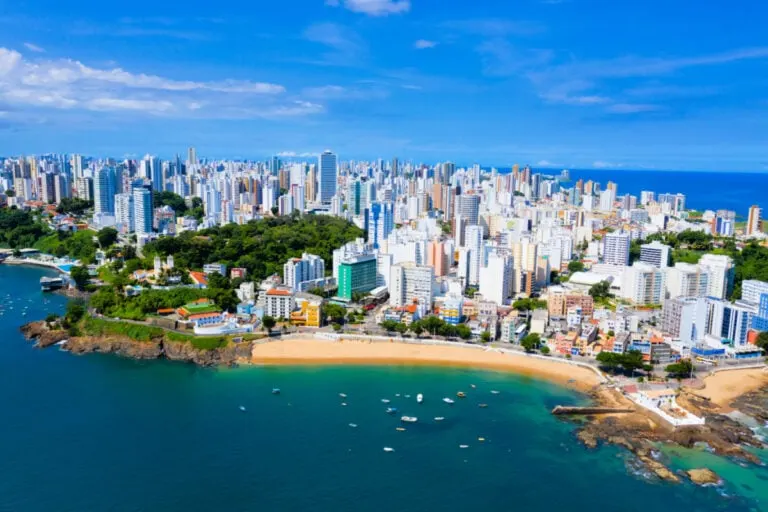Famous for its upscale Copacabana Beach, unique mix of sprawling concrete jungle and actual jungle, and thriving comunidades, Rio is Brazil’s most sought-after tourist destination, but it can be particularly hard on the wallet if you’re not willing to compromise on comfort and safety.
Some of the cheapest four-star hotels in the most touristy parts of town are over $100 in the off-season, a staggeringly-high rate for Latin America, and between overpriced dinners and shopping in dollarized malls, you’re easily looking at spending $2,000 in a week on average.
Rio is one of the most expensive cities in the Global South, but lucky for budget-conscious travelers who are keen on experiencing Brazil, it’s not reflective of prices elsewhere in the country:
Salvador de Bahia Is Like Rio, But Far Cheaper

If you’re looking for a cheaper alternative to the ‘Marvellous City’, you should give Salvador de Bahia a whirl.
Located in the Brazilian Northeast, it is one of the country’s oldest settlements, founded as early as the 16th century, and is both a cultural and beach hotspot.
Rio gets all the fame and the praise, but Salvador is just as stunning: for starters, it has a far-better preserved historic center named Pelourinho, with Portuguese colonial architecture, colorful houses, and even a UNESCO-listed, Baroque ‘Slave Church’ to call its own.

Pelourinho is one of the most culturally-charged sites in all of Brazil, as it oozes Old World charm, and it has been left virtually untarnished by subsequent developments, unlike Rio: with rare exceptions, the modernism-stricken capital of tourism wasn’t so lucky.
One of Salvador’s most-prized assets is the Sao Francisco Church, arguably the prettiest in Brazil, with an altarpiece adorned with gold, silver and other precious stones, and frescos are so detailed they rival the Sistine Chapel’s.
The Most Beautiful Beaches In Brazil Are In The Northeast

Away from the hilly cobbled center, Salvador is a vibrant coastal metropolis straddling the bright-blue Atlantic, fringed by long, Caribbean-like sandy beaches, and boasting a high concentration of resorts (far more affordable ones, at that).
Porto da Barra is one of the best-frequented beaches in town, sandwiched between the azure waters and a series of Portuguese walls, though the most scenic spot, with crystalline waters and the iconic fortified lighthouse for backdrop is Farol da Barra.
Salvador is the most popular destination for Brazilians themselves, who unlike Americans and Europeans, are not exactly big spenders, and we will take a wild guess here and say it might have something to do with its inexpensiveness as a beach getaway.
How Actually Cheap Is Salvador?
There are literally resorts like the Gran Hotel Stella Maris, with winding pools and private beach access, and a sumptuous breakfast spread included every morning, for only $77 a night, while the four-star Iguatemi Business will only set you back by $45.

On average, if you’re coming to Salvador, you should plan on spending $48 on hotels per night and an additional $35 on food, or a total of $311 per week (R$1,575), and speaking of all the amazing food you could have here…
The cuisine of Bahia, the state Salvador is a capital of, is an immaterial cultural heritage of Brazil, reflective of the city’s rich Afro-Brazilian and indigenous Brazilian makeup, and a fleeting visit to the local Rio Vermelho Market will neither break the bank, nor let down the foodie in you.

We’re talking the prawn-based, flavorful bobo de camarao curry, the deep-fried fritter populary known as acaraje, made by African-Brazilian women wearing traditional baiana white skirts, and of course, moqueca seafood stew (can’t forget about that one).
On The Safety Issue
Regarding safety, no trip to Brazil is exactly a smooth ride: you’ll be required to take certain additional precautions that wouldn’t be advised elsewhere.

These include avoiding any signs of wealth, and this includes not taking out your iPhone in public, even to take calls or message, as it is a luxury item in Brazil, keeping valuables in a hotel safe, and your wallet in your front pocket while in public.
Salvador is no exception, and whether you’re strolling the lively streets of Pelourinho or lounging by the beach in Farol da Barra, you’re urged to keep your wits about you and be vigilant of your surroundings, as pickpocketing and theft are rife.

That being said, most visitors are not affected by crime when visiting, though they often attribute their stress-free experience to following local safety advice, having kept a low profile, and avoiding critical zones, especially at night.
For the most part, however, you’ll realize bahianos are some of the kindest, most humble, friendliest people on Earth, and you’re certain to return home with nothing but fond memories of sun-drenched Bahia, its delectable, flavorful foods, and gorgeous coastline.
Credit: Source link


